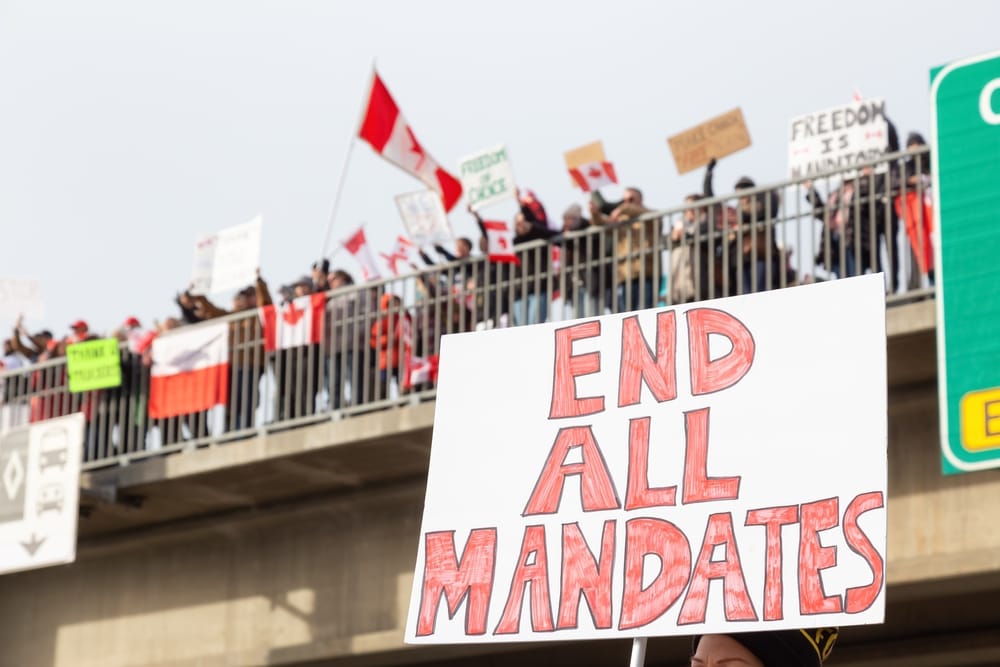
As Canadian truckers and sympathizers dig their heels in their (main) battle for coronavirus mandates to be scrapped, their example proves to be a continuing inspiration to some across the ocean. Their continental offspring are mobilizing for one single aim—a large, co-ordinated, pan-European presence in Brussels, home to the EU’s main institutions, on Monday, February 14th.
Besides wanting the abolition of the corona measures, the protesters demand something be done about declining purchasing power and high fuel prices—making them strikingly similar to the gilets jaunes who rocked Paris only a few years ago. Since no permit had been filed, Brussels has said it bans the demonstration, and that federal police will be checking vehicles at the Belgian border, De Standaard reports.
To avoid Brussels being completely blocked off, Minister of the Interior Annelies Verlinden (CD&V), Prime Minister Rudi Vervoort (PS) and the Mayor of Brussels Philippe Close (PS) have joined forces to tackle the advancing convoy. Minister Verlinden is coordinating their efforts. “All police districts, with the help of the federal police, will divert motorized vehicles that are coming despite the ban,” Mayor Close explained in a tweet.
De politiezones, met de hulp van de federale politie zullen gemotoriseerde voertuigen die ondanks het verbod naar de hoofdstad komen, omleiden.
— Philippe Close (@PhilippeClose) February 10, 2022
Deze samenwerking tussen de 3 bestuursniveaus heeft tot doel om de openbare orde in de hoofdstad zo min mogelijk te beïnvloeden.
Authorities also advise not to come to Brussels by car on Sunday. “There have been calls on social media for people to come to Brussels from various European capitals to participate in the Freedom Convoy. We see those messages circulating. We advise everyone to avoid the center of Brussels and the access roads on Sunday afternoon. We will share all information about this in real time via Twitter,” said Ilse Van Dekeere, spokeswoman for the Brussels-Capital-Ixelles police district, adding that they expect “blockades with trucks. We are of course prepared, but we will not communicate about the deployment of troops.”
An estimation of the possible size of the protest proves difficult, Carine Knapen, a lawyer of the non-profit organization Hands For Freedom, which provides logistical support for the protestors, confirms: “I have no idea how many truckers there will be. But they will be many, coming from many countries. From Norway, from Spain, from Italy … I have even seen images of five trucks that departed from Israel,” she said. In Belgium, Knapen is well-known as an activist striving to scrap corona measures, such as the CST (COVID Safe Ticket), a requirement to be able to participate in public life.
Knapen went on to say that the initiative has no single organization behind it, but that “different groups of people from different countries are responsible for coordination,” which means that “we have little control over exactly what will happen.” Whether there would be any blockades, she didn’t know. “The drivers decide that themselves. It is a peaceful protest, although we fear that Antifa activists will mix again to start a riot,” Knapen said. “We never protest against anything, but we do protest for democracy, for freedom, and for human rights. This includes people who are against the CST, against mouth masks, or against (mandatory) vaccinations. But that is of course also for freedom.”
A foretaste of what is awaiting Brussels can be gleaned through various social media accounts and groups. One such account, an umbrella of sorts, belongs to European Freedom Convoy 2022, which consistently tweets on the various initiatives which have been started along national lines.
These urge citizens to join Telegram groups, where they can further communicate and coordinate. Telegram, which uses encryption, has been a favored platform for COVID mandate critics of various orthodoxies, especially after mainstream ones, such as Facebook and Twitter, started to clamp down on “misleading vaccine information” in late 2020.
⚠️The 14th February 2022 Will be the Day when ALL European Convoys will RDV in Brussels and Siege the European Capital until Vaccination Pass and Associated Restrictions are Abolished. #TruckersForFreedom2022 #TruckersForFreedomEurope #europeanfreedomconvoy @EuropeConvoy pic.twitter.com/ukOFqyi2xd
— European Freedom Convoy 2022 🚛 🇪🇺🇨🇦🇺🇸 (@EuropeConvoy) January 30, 2022
In their tweets, videos show vehicles riding together, gathering at predetermined locations, after which they head to their capitals, where they are joined by pedestrians in protest. Most, if not all, plan to head to Brussels next.
#France 🇫🇷Convoi de la Liberté🇫🇷
— European Freedom Convoy 2022 🚛 🇪🇺🇨🇦🇺🇸 (@EuropeConvoy) February 9, 2022
Words from the Convoy 👏👏 (eng sub) #TruckersForFreedom2022 @EuropeConvoy #ConvoidelaLiberte pic.twitter.com/na626aJnYM
#Austria 🇦🇹 FREEDOM CONVOY TO VIENNA 🇦🇹https://t.co/zWjDgIRNB7
— European Freedom Convoy 2022 🚛 🇪🇺🇨🇦🇺🇸 (@EuropeConvoy) February 9, 2022
Freedom Convoy Austria 11. feb 2022
Video: https://t.co/yBzyjLTPkM #TruckersForFreedom2022 #FreedomConvoy2022 #europeanfreedomconvoy #FreedomConvoyAustria2022@EuropeConvoy pic.twitter.com/28mWtAC7ny
#Germany 🇩🇪 Convoy DE 🇩🇪
— European Freedom Convoy 2022 🚛 🇪🇺🇨🇦🇺🇸 (@EuropeConvoy) February 9, 2022
Main Chanel: https://t.co/CHhkTrLP1r
Subgroups: https://t.co/UneJII41T2
BERLIN WIR KOMMEN!!!
Berlin Here We Come !!#TruckersForFreedom2022 #FreedomConvoy2022 #europeanfreedomconvoy #convoygermany @EuropeConvoy pic.twitter.com/V3e2jl7Q9D
#Netherlands🇳🇱 Official Convoy Nederland Nieuws🇳🇱https://t.co/9IaAhPhtKbhttps://t.co/j3YRZbRoWJ
— European Freedom Convoy 2022 🚛 🇪🇺🇨🇦🇺🇸 (@EuropeConvoy) February 9, 2022
‼️ Convoy Netherlands – February 12 ‼️
‼️Sat 12 February we will hit the road for freedom ‼️#TruckersForFreedom2022@EuropeConvoy #ConvoyNederland pic.twitter.com/aBCiTDsV5X
Thus far, it all appears rather inchoate, as such initiatives tend to draw in a wide variety of supporters, with an equally wide variety of grievances. Yet logistically, it shows itself to be fairly well-organized. An interactive Google map, which will be updated in the following days, shows travel routes, points of interest labeled ‘meeting,’ ‘pick-up,’ and ‘synchro,’ as well as the location of various citizen initiatives that will be providing goods and services, such as food, drink, and first aid. It also indicates various zones within Brussels, such as ‘do not enter,’ ‘trucker village,’ and ‘welcome to the party’ areas.
Judging from their rhetoric, if sufficient momentum can be built, this European expression of Canada’s Freedom Convoy has all the makings of a new liberation movement—one that could very well go beyond COVID-19, perhaps becoming one that is more comprehensively anti-establishment in nature.
